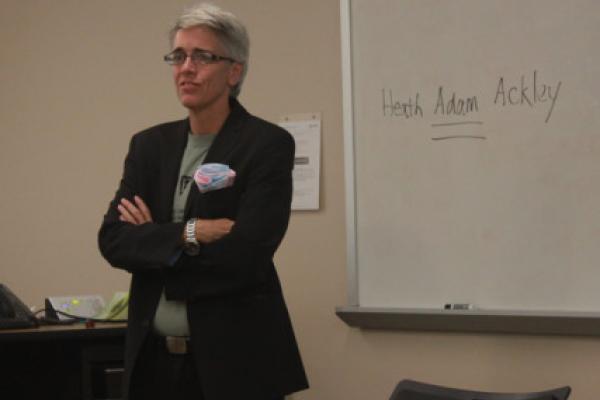A straggle of kids came up for children’s time at Poland Presbyterian Church, a 211-year-old congregation established on Lot One, in Township One, in Range One of what was once known as the Connecticut Western Reserve.
The church’s education minister asked them to do this year’s CROP Walk in nearby Youngstown. Two miles, five miles, whatever they can do to raise money for alleviating hunger.
“Seventeen million children will go to bed hungry in America tonight,” she explained.
A huge statue of the Virgin Mary towers over churches, monasteries and mosques in the Syrian city of Maaloula, where a dialect of the Aramaic language of Jesus is still spoken.
The town has managed to stay out of the Syrian conflict between Sunni Muslim rebels and the regime of dictator Bashar Assad, as have most of Syria’s 2 million Christians.
But worsening violence has forced the community into a corner: Continuous clashes between the rebels and the regime in this isolated town of 2,000 people as well as other Christian towns over the past two weeks have many Christians worried that they will no longer be allowed to stay neutral.
As the Creation Care campaign associate at Sojourners, my job is to get people thinking about God’s call for us to care about the creation. Usually, I do that from behind a desk in Washington, D.C., but recently I got to do it from a boat out on the bayou in Louisiana, in a tiny community that has been hit by eight disasters in eight years (seven hurricanes and the Deepwater Horizon oil spill). I took 100 people out to the town of Jean Lafitte, less than an hour from New Orleans, to hear from people who live on the front lines of climate change.
One of the obstacles to igniting a passion about climate change is that it feels so abstract; it feels like a future problem, a global problem. But it’s really a here and now problem. We took folks out on the Louisiana bayou to meet with those who are living in the midst of climate change – people who don’t think of themselves as environmentalists, but who can bear witness to the impact that climate change and our use of dirty energy have had on their lives, personally.
The town of Jean Lafitte is an old and diverse town, a close-knit community where faith is important to many people, including the mayor. It’s a town that sounds a lot like the early Christian church. We were told that homelessness is not a problem there – if your neighbor loses her home, why wouldn’t you take her in? We were told that when the state government showed up two weeks after Hurricane Katrina, the town had recovered so quickly that the government thought the hurricane hadn’t hit them. This community comes together, and because it knows how to survive, it often gets forgotten by government responders and by oil companies like BP.
Pope Francis criticized what he called the “idolatry of money” on Sunday in a trip to one of the poorest regions of the European Union.
The pontiff, visiting the island of Sardinia off Italy’s western coast, departed from his prepared remarks to talk about his own family’s struggles as Italian immigrants in Argentina. Speaking on an island where more than half of workers under 30 are unemployed, Francis told the masses: “Don’t let yourselves be robbed of hope.”
A California Christian university has asked a professor who was once its chair of theology and philosophy to leave after he came out as transgender.
Heather Clements taught theology at Azusa Pacific University for 15 years, but this past year, he began referring to himself as H. Adam Ackley. “This year has been a transition from being a mentally ill woman to being a sane, transgendered man,” he said.
Ackley, who is in his third year of a five-year contract at a school that does not use the tenure system, said university policies seem to be silent about transgender issues, except that “Humans were created as gendered beings.”
Abercrombie & Fitch will change its “look policy” and allow employees to wear hijabs after a three-year legal battle with two Muslim women was settled out of court.
The settlement requires Abercrombie to report religious accommodation requests and discrimination complaints to the Equal Employment Opportunity Commission for three years, and includes $71,000 in compensation for the two women. The settlement also averts a Sept. 30 trial.
Abercrombie fired Umme-Hani Khan, a stockroom worker in its San Mateo, Calif., store, in 2010 for refusing to work without her religious headscarf. Khan, who had worked at the store for four months without incident, filed a religious discrimination complaint with the EEOC, which sued the retailer in 2011.
The U.S. has resisted this peacemaking policy for generations. Even as far back as 1792, a signer of the Declaration of Independence, Benjamin Rush, along with Benjamin Banneker, suggested the blueprint for an Office of Peace (intended to counter what was then known as the Department of War). President George Washington stated that his first wish was “to see this plague of mankind, war, banished from the earth,” yet legislation for a Department of Peace was not introduced until 1935, which, by 1969 wasfollowed by 90 additional bills. And so, while many U.S. citizens state a longing for peace and nonviolence, we seem to lack the political will and public motivation to make it a reality, and the result is a continued state of destruction.
I wish that we, as a people, would speak better words to those who have served in our wars. I fear that we do them, and ourselves, a disservice when we call them all heroes without letting them decide which deeds were heroic and which should be left unspoken. When we call everyone who wears a uniform a hero, we diminish heroism everywhere.
I don’t mean we should refrain from thanking those who serve. If anything, we should thank them far more than we do, and our thanks should not just be in words. Our thanks should be sincere and long-lasting, and expressed in things like the best military hospitals we can afford, the best education we can provide, and our best efforts to ensure that their generation will be the last to endure what they have endured. Even if those ideals prove to be unattainable, we should not let that stop us from trying to attain them. As the Talmud says, “It is not your job to finish the work, but you are not free to walk away from it.”
1) Jesus Avoided Labels
In fact, a large part of his ministry was breaking down preconceived titles, trying to bring about a world where there would be no differentiation between Jew or Gentile. He promoted the idea that loving God trumped racial, ethnic, social, religious, and political identities.
This doesn’t mean we’re simply “all the same underneath.” Jesus recognized that people had distinct differences, on both a personal and communal level. He embraced unique cultures and traditions and utilized them to reveal his glory, recognizing and valuin




![Abercrombie & Fitch Logo. Via RNS/courtesy Jaime Berrezueta [Public domain], via Wikimedia Commons](https://sojo.net/files/styles/large_rectangle_crop/public/blog/Abercrombie_Logo.jpg)


